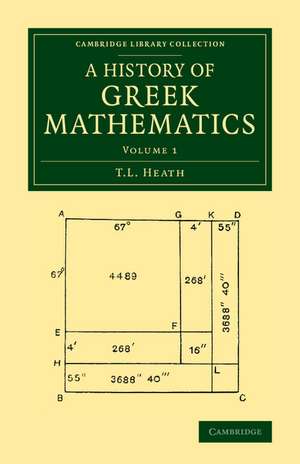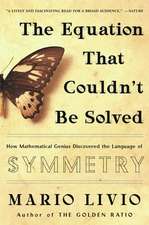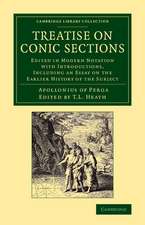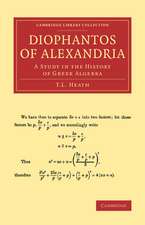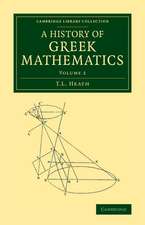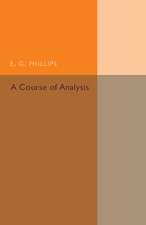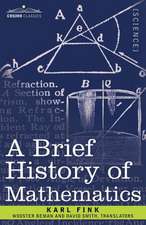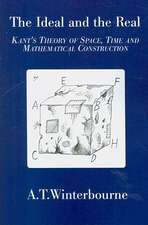A History of Greek Mathematics: Volume 1: Cambridge Library Collection - Classics
Autor T. L. Heathen Limba Engleză Paperback – 20 noi 2013
Din seria Cambridge Library Collection - Classics
-
 Preț: 190.89 lei
Preț: 190.89 lei - 15%
 Preț: 406.99 lei
Preț: 406.99 lei -
 Preț: 173.84 lei
Preț: 173.84 lei - 23%
 Preț: 1994.62 lei
Preț: 1994.62 lei - 23%
 Preț: 1663.03 lei
Preț: 1663.03 lei - 23%
 Preț: 1380.34 lei
Preț: 1380.34 lei - 23%
 Preț: 1368.85 lei
Preț: 1368.85 lei -
 Preț: 342.69 lei
Preț: 342.69 lei - 5%
 Preț: 13881.42 lei
Preț: 13881.42 lei - 19%
 Preț: 544.37 lei
Preț: 544.37 lei -
 Preț: 349.59 lei
Preț: 349.59 lei - 23%
 Preț: 748.69 lei
Preț: 748.69 lei -
 Preț: 374.96 lei
Preț: 374.96 lei - 19%
 Preț: 688.41 lei
Preț: 688.41 lei - 19%
 Preț: 643.69 lei
Preț: 643.69 lei -
 Preț: 519.66 lei
Preț: 519.66 lei - 19%
 Preț: 495.90 lei
Preț: 495.90 lei -
 Preț: 368.30 lei
Preț: 368.30 lei -
 Preț: 368.30 lei
Preț: 368.30 lei -
 Preț: 367.54 lei
Preț: 367.54 lei -
 Preț: 465.21 lei
Preț: 465.21 lei -
 Preț: 531.54 lei
Preț: 531.54 lei -
 Preț: 445.49 lei
Preț: 445.49 lei -
 Preț: 281.33 lei
Preț: 281.33 lei -
 Preț: 377.01 lei
Preț: 377.01 lei -
 Preț: 367.33 lei
Preț: 367.33 lei -
 Preț: 421.20 lei
Preț: 421.20 lei -
 Preț: 282.25 lei
Preț: 282.25 lei -
 Preț: 429.94 lei
Preț: 429.94 lei -
 Preț: 465.98 lei
Preț: 465.98 lei -
 Preț: 332.07 lei
Preț: 332.07 lei -
 Preț: 367.71 lei
Preț: 367.71 lei -
 Preț: 519.83 lei
Preț: 519.83 lei -
 Preț: 518.30 lei
Preț: 518.30 lei -
 Preț: 241.66 lei
Preț: 241.66 lei
Preț: 471.83 lei
Nou
Puncte Express: 708
Preț estimativ în valută:
90.29€ • 98.05$ • 75.85£
90.29€ • 98.05$ • 75.85£
Carte tipărită la comandă
Livrare economică 22 aprilie-06 mai
Preluare comenzi: 021 569.72.76
Specificații
ISBN-13: 9781108063067
ISBN-10: 1108063063
Pagini: 468
Dimensiuni: 140 x 216 x 26 mm
Greutate: 0.59 kg
Editura: Cambridge University Press
Colecția Cambridge University Press
Seria Cambridge Library Collection - Classics
Locul publicării:Cambridge, United Kingdom
ISBN-10: 1108063063
Pagini: 468
Dimensiuni: 140 x 216 x 26 mm
Greutate: 0.59 kg
Editura: Cambridge University Press
Colecția Cambridge University Press
Seria Cambridge Library Collection - Classics
Locul publicării:Cambridge, United Kingdom
Cuprins
Preface; 1. Introductory; 2. Greek numerical notation and arithmetical operations; 3. Pythagorean arithmetic; 4. The earliest Greek geometry; 5. Pythagorean geometry; 6. Progress in the elements down to Plato's time; 7. Special problems; 8. Zeno of Elea; 9. Plato; 10. From Plato to Euclid; 11. Euclid.
Descriere
Originally published in 1921, this rigorous two-volume work traces ancient Greek mathematics from Thales of Miletus to Diophantus of Alexandria.
